Afghan migration to Western Australia played an important role in the state’s early development. Kate Ferguson caught up with members of Perth’s Afghan community both young and old, to find out what life has been like since moving to our shores, and what they endured to get here.
Understanding Afghan migration
In the mid 19th century, Western Australia saw the arrival of men who became known as the 'Afghan Cameleers'. These camel-mastering migrants were a feature of outback towns for more than 50 years, as they opened up long-distance transport routes throughout remote and desert regions of Western Australia.
The Cameleers helped construct inland railways, the Overland Telegraph Line, and were major suppliers for mining towns, pastoral stations and exploration expeditions.
When motor transport reached the West Australian outback in the 1920s, the era of the Afghan Cameleers came to an end. The second wave of Afghan migration to Australia has been shrouded in heartbreak and desperation – an escape from the brutal and relentless waste of war.
In December 1979, the Soviet Union invaded Afghanistan, sparking the Soviet–Afghan War. Soviet forces killed the Afghan President and launched a violent, decade-long takeover.
The United Nations condemned the attack, and Afghanistan fought back. Insurgents – the Mujahideen – received aid and military training in neighbouring Pakistan and China, paid for primarily by the United States and Arab monarchies in the Persian Gulf.
The conflict with the Soviet Union caused an incredible amount of bloodshed, with up to 1.5 million Afghan civilians killed, and millions more forced to flee.
Australia accepted some Afghan refugees, increasing the Afghanistan-born population to almost 1000 during the early 1990s. The majority settled in Victoria and New South Wales, with a small number staying in Western Australia.
However, the Soviet withdrawal did not see an end to the violence. Without strong governance, Afghanistan was left vulnerable. Factional fighting began, which led to the emergence of the Taliban, who imposed strict Islamic religious controls on the population.
Taliban extremists launched a civil war upon ethnic minorities in Afghanistan, like the Hazara – descendants from Mongols, whose Asiatic features are easy to recognise in Afghanistan. They share their Shia faith with Iran, in conflict with the Taliban's Sunni Muslim beliefs, and thousands were driven out into nearby Iran and Pakistan.
The violence didn't stop at the border, however, and the Hazara and other minorities were soon forced to seek safety on distant shores.
More than half of Western Australia's 4000-strong Afghan population has arrived since 2001, mainly as humanitarian entrants.
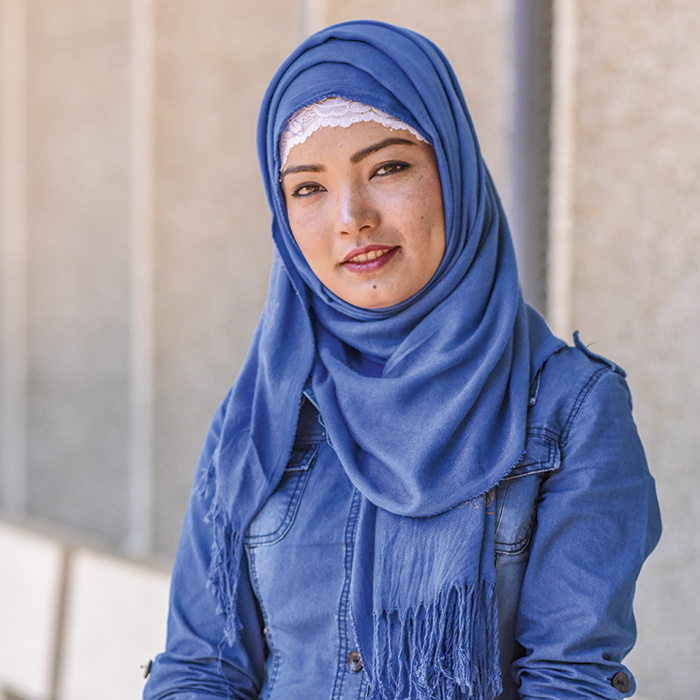
Rahila Haidary
Age 20, Student
My father used to travel a lot with his job. When he returned home, he would often tell me about school. It sounded so exciting to me; I had never been to school before. In my town, the mosques taught education, and only the boys were allowed to attend.
I wanted to go to school so much. I wanted to learn. So, when I was six, I dressed up in my boy cousin's clothes and went to the village mosque to learn, just like the boys. I had no idea what I had got myself into. That afternoon, there was a big meeting called with the leaders from the village, and the Taliban were informed. They decided I should leave the village and not return, and if I did, they would kill me. My Dad took me to Pakistan, and left me with my grandmother and auntie.
When I was fourteen, the Taliban wanted my family's orchard in Afghanistan. My Dad's brother and father were dead, and he couldn't fight the Taliban alone, so he had to flee. He left overnight with all of my family members. He sent my mum and the rest of my family to Pakistan. For six months, we had no clue where he was. One day, he called and he said "I'm in Christmas Island". I had no idea where that was.
In 2011, we were granted humanitarian visas. What has followed has been like a dream. We moved to Shepparton in Victoria, and in 2014 I moved to study a double degree of political science and law at the University of Western Australia. I was chosen from 250 applicants to be a UNICEF Australia youth ambassador. I hope to continue fighting for children's and women's rights in United Nations one day.
Looking back, I think my Dad is a hero. If he hadn't sought refuge, we would have been found by the Taliban. He gave us a new life, and I am so thankful to Australia for accepting us.
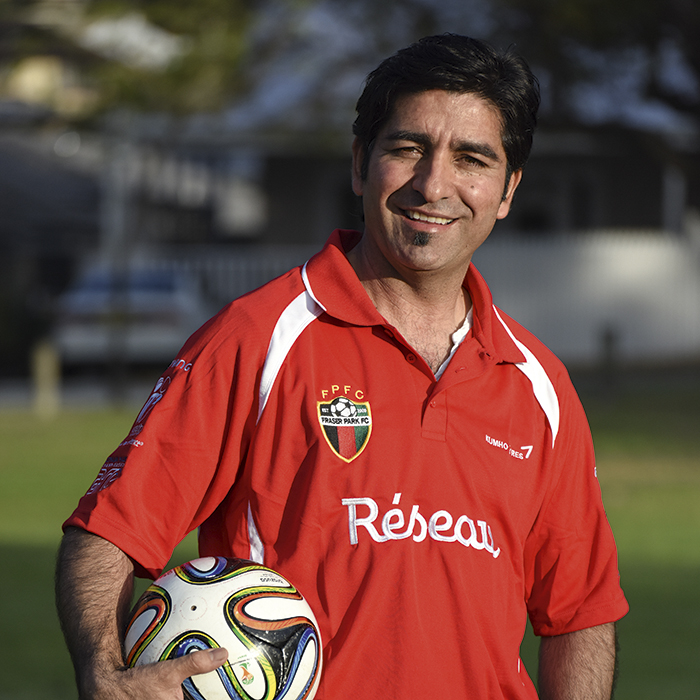
Jawid Farahmand
Age 43, Business owner
My father received a scholarship to study water and soil research in Australia. Five years later, in 1983, the trouble started in Afghanistan, so he sponsored us to come over to Australia with him.
Getting here was a challenge. In those days, you weren't allowed to leave Afghanistan, so my mother and six siblings pretended we had to attend a wedding. As we were fleeing to Pakistan, the truck behind us was rocketed by the Soviet Union, and the passengers were killed. We travelled in tractors and on foot, and slept in concealed caves. It took us seven months to reach Australia. I was eleven at the time.
We were one of the first families during that era to arrive in Western Australia. I couldn't speak any English, but I learnt quickly at school. I also discovered soccer. I went from not knowing what the sport was called in Australia, to being the captain of the team at Kent Street High School, and have been playing ever since.
About eleven years ago, I decided to start a soccer club in Perth out of my own pocket. We formed a team called the Ashgans in Ashfield, then six years ago we started the Fraser Park Football Club in East Victoria Park.
These days, we have around ten teams. We have a mixture of ages, ethnicities and religions. Everyone is welcome. I always encourage young guys to play. I pick them up from the train station and bring them to the oval for training.
Supporting others is very important and my family is my support. My wife is from Afghanistan, and I have two daughters – I think it's extremely important that my daughters value respect for all people and a good education.
Sadly, I lost the connection with my extended family when we left Afghanistan, but we have created our family here. We are a small family, but a close one. We must look after each other. That's how we survived.
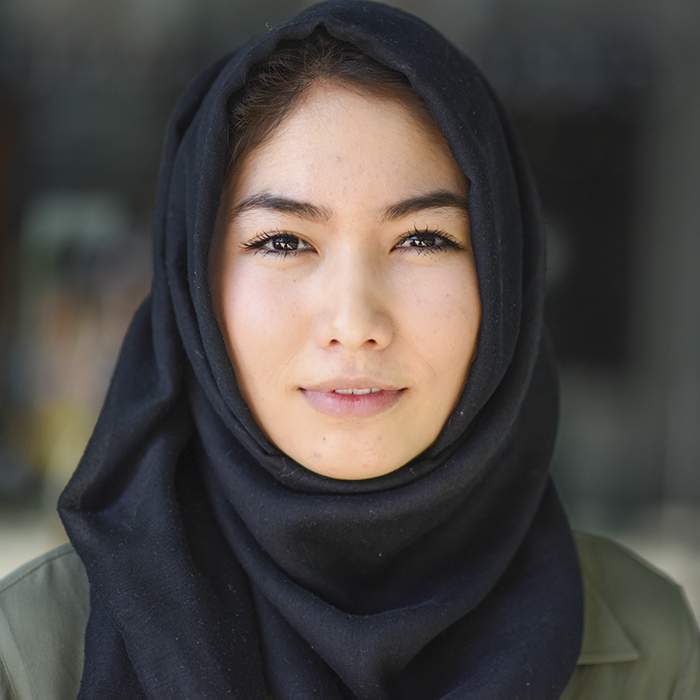
Rahila Haidari
Age 18, Student
I have learnt that once you become a refugee, you lose your identity. In 2004, my family fled Afghanistan to Quetta, Pakistan. We are from the minority Hazara group [that's been persecuted by the Taliban], and my father sought permanent residency for us in Australia because we continued to be targeted in Pakistan.
Leaving at such a young age, I lost my connection with Afghanistan. I don't fit in with the Afghani community, and I feel like I am constantly having to prove myself as an Australian citizen, too.
At Murdoch University, I was introduced to Amnesty International, and have since become the convener at my university, which has given me a fantastic introduction to activism and human rights. I recently organised the Syrian refugee vigil in Perth, with the help of Get Up! on social media. Around 1000 people attended at short notice, and the media turned up. It was an incredible experience.
Another highlight was being selected to attend the University Scholars Leadership Symposium run by Humanitarian Affairs UK in Hong Kong last year – there were over 800 people there from all over the world – and going to Nepal to help rebuild after the earthquake.
People don't understand that identity is very important and when you don't belong somewhere, you feel very lost. It's not healthy having to constantly prove yourself and show that you deserve a fair go, like anyone else.
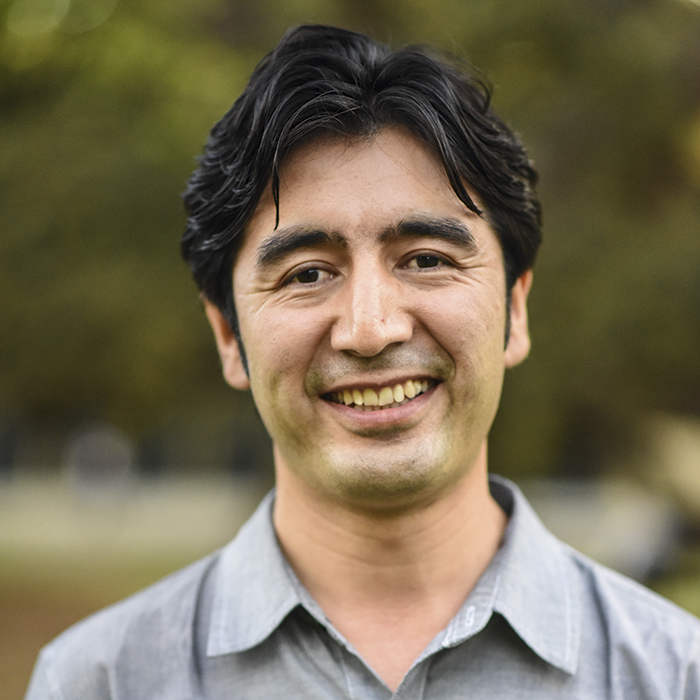
Deedar Khudaidad
Age 27, Student
I came to Australia in 2011. I felt unsafe in Afghanistan, constantly on edge as a Hazara man. My brother was living in Perth and helped get me a visa.
In the beginning, there were challenges. My English wasn't at university level and I struggled to find the services I needed to start studying and find a job. This inspired me in 2014 to start the Salsaal Integration Association (SIA), of which I am president. SIA is a Perth-based, not-for-profit organisation, providing cultural, educational and recreational programs and promoting awareness between people of diverse communities in WA. We have a student committee, to help provide information to refugees about education and finding work, run a community languages school, organise cultural events, and work to increase the involvement of Afghan women in the community.
Overall, the environment, people and facilities provided to me in Australia have been amazing. I had the opportunity to finish my university degree, to live a peaceful life, find a job quickly and get busy with work. The Australian people have been so kind to me. I'm really enjoying living in Australia and am so thankful to be here.
Recently, I have been selected to take part in a national community language conference in Brisbane, with the Office of Multicultural Interests and Community Languages Australia, which is going to be very helpful in terms of connections with other communities, raising awareness about the program, and personal/professional networking.
I hope that after finishing my Masters in international relations and national security at Curtin University, I can find a job quickly and start working for the government.
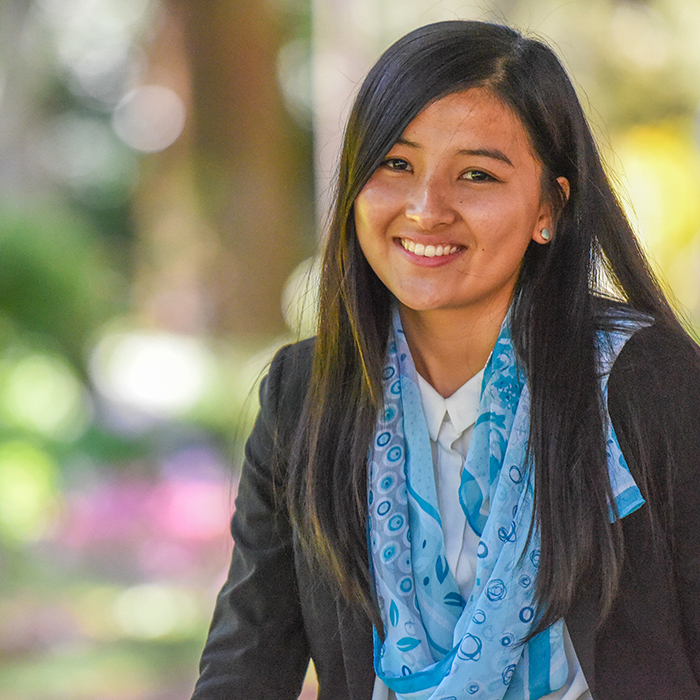
Wahida Samim
Age 19, Student
I'm a first generation Australian. My family are Hazara. My dad decided to come to Australia by boat. He was in detention for seven months and received a temporary visa after he was released.
It was very hard to be away from my father. After being apart for six years, I'd completely forgotten what he looked like.
Around 2004, my Dad received a Humanitarian Protection Visa and could sponsor my mother and I to move to Australia.
In 2005, we reunited with my father in Sydney, and moved to Perth in 2007. My parents are my role models, together they have sacrificed everything for a better future for their family.
I am incredibly lucky and fortunate to be part of the Australian community, and to call Australia home.
Coming from a multicultural background has helped me understand the problems migrants and refugees face, but what I'm really interested in is finding solutions to
those problems.
There's a lot of mental health issues with refugees and asylum seekers, caused by feelings of isolation and disconnection, so I'm working with the Salsaal
Integration Association (SIA) to help migrants with very limited English.
The aim of our language classes is to chat, make friends and learn about Australian culture and people. It's about saying welcome, and creating an informal platform for them to engage and interact.
Afghanistan is more than a war-torn country; it has a beautiful and deep culture that is entwined within its people. I would love to go back and play my part, and contribute to reshaping Afghanistan.

Ghulam Rasuly
Age 62, Truck driver
Pre-Soviet invasion, Afghanistan was a peaceful country and life was relatively easy and enjoyable. After we were invaded, we were left with no choice but to defend our liberty. I played my role, mainly in the organisation and management fields of the resistance against the Soviets.
With the defeat of the Soviet Union in 1992, NATO and the Western Democracy
packed up and left.
I would have loved to have stayed and reaped the rewards of the struggle, but for me the future was quite bleak and scary.
The safety of my kids and my family were at stake, so we applied for a Special Humanitarian Program Visa and fled to Australia.
In 2002, I returned to Afghanistan to see my family. The elections were taking place to appoint the temporary government. The people of Sancharak insisted that I stand at that election as a local candidate. Traditionally, when people give you that deal of respect you can't deny them, so I had no choice but to stand.
Out of the eleven candidates, I won. I went to Kabul for five days, to the emergency national assembly. I was there for six months.
After meeting with the top heads of government, it disappointed me the way they
were carrying on. I could see that history was about to repeat itself, as the Soviet Union returned, backing the communist elements of the government.
I felt sad when I returned to Australia, because I had missed out on six months of being with my children, but also sad that I couldn't do what the people hoped of me in Afghanistan.
I returned to taxi driving. It was a flexible job. I could attend to my family's needs without restrictions. For fifteen years, I had the opportunity to hear people's life stories. I have learned so much from listening to people. Sadly, the taxi industry is experiencing a downturn, so I now drive trucks.
Australia is home for me and my family. We are now Australian citizens, and three of my six children were born here.
Looking back, I have no regrets. Life is a blessing. For me, it has never been easy but it's never been impossible. You can't change the world but you can change yourself.
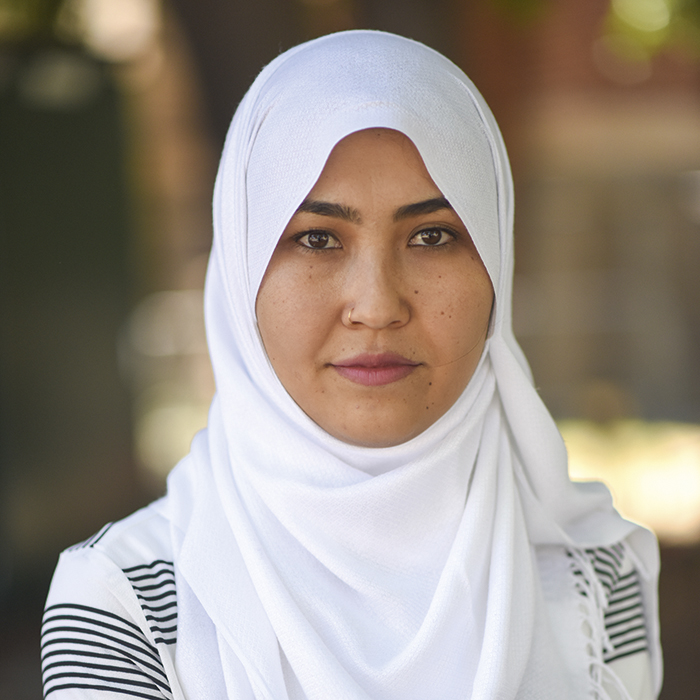
Naseebeh Rizay
Age 24, Student
It takes a lot to leave your home country, to leave your family and loved ones behind. In our case, it involved a lot of tragedy and a lot of courage.
My family fled to Pakistan when I was nine, to escape the persecution of the Hazara people by the Taliban. My father had already made his way to Australia to find us a better life. He was held in asylum, before moving to Katanning to work in a meat factory. I didn't see him for nine years. During that time, he was diagnosed with lung cancer and had to battle the fear of death alone. Following an operation to remove most of his lungs, he was told the tumour wasn't malignant.
Shortly afterwards, he was granted a visa and sponsored us to move to Australia. It was a strange experience to be reunited after all that time and turmoil. I was so relieved, but it took us quite some time to recreate the bond – especially my brother, who was very young when my father left, and couldn't remember him.
I found the move to Australia very difficult. There weren't many resources available to help settle in to the Australian way of life. I so wanted to meet new friends. It was a very lonely time.
My now-husband and I kept in contact while I was in Australia. He wasn't able to visit, due to restrictions with the visitor visa. I couldn't bear returning to Afghanistan, so we met in Pakistan and married there. We so badly want to be together but so far we've found nothing but roadblocks.
I have been told I have to visit him every six months to prove our relationship, however Afghanistan is a very dangerous place for us, and I am a student, so I can't afford the flights right now. I constantly fear for his safety. In the interim, I have found great solace in helping other people. It's difficult to navigate Perth without good English and a car, so I drive people to appointments and help out where I can. I don't want people to experience the same level of loneliness and isolation that I did.
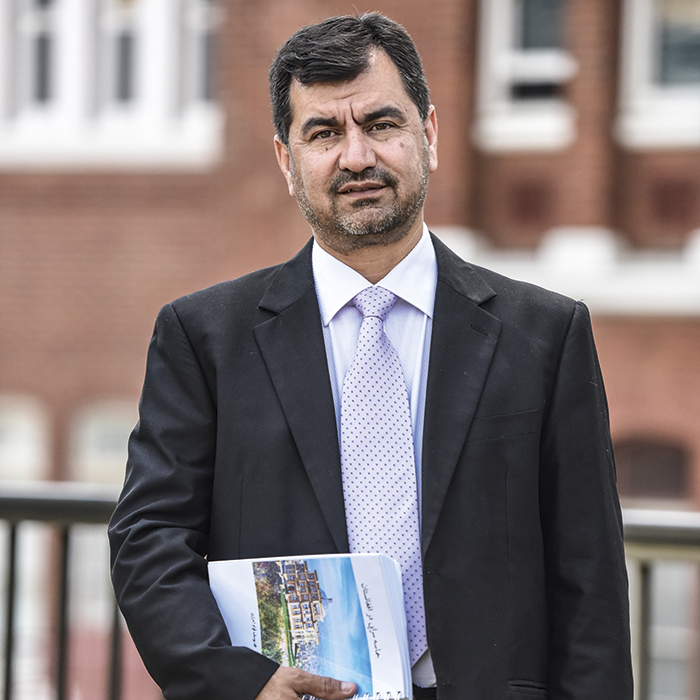
Mohammad Qawwam
Age 49, Taxi driver
Six months after I got married, the Taliban gained control of Herat, the city we were living in. I was working in the government sector, so had to escape immediately. I crashed my car while the Taliban were chasing me, and hid in a pit until they left. Another Afghan who was also escaping gave me a lift, and we fled to Iran. I didn't see my wife for one month after that.
Afghans were subjected to racism in Iran, so we moved to Kabul, as it was not yet controlled by the Taliban. Two months later, they gained control. We fled to Pakistan, and my cousin living in Perth offered to sponsor us. We received our visas in 1998.
In Afghanistan, I worked as an assistant physician, a writer and chief administrator. I worked for magazines and newspapers. I have written and edited eight books and also made some documentary clips about Afghanistan. In Australia, I have had difficulties getting my qualifications and experiences recognised. I studied a Cert IV, Diploma and Bachelor of Science in IT but still couldn't find a job.
Currently I am volunteering at Fiona Stanley Hospital, while working as a taxi driver. I'd love a job in a hospital again in any capacity. I have been working as chairman of Afghan Australia Cultural Council for the past four years. Building a community centre for Afghans in WA is my biggest dream as Afghans played a major role in Australian history.